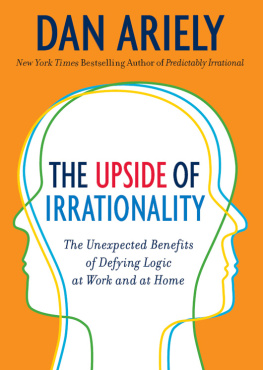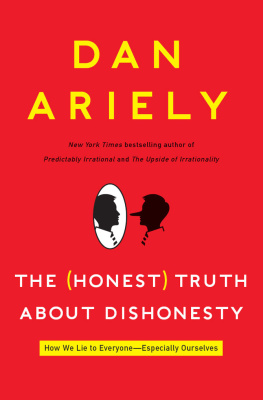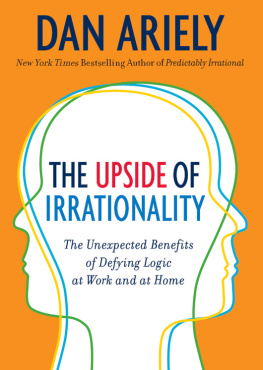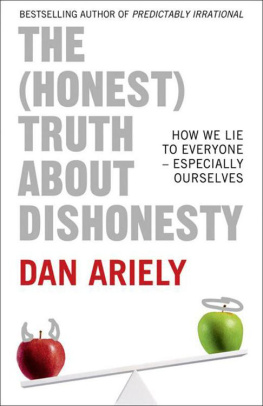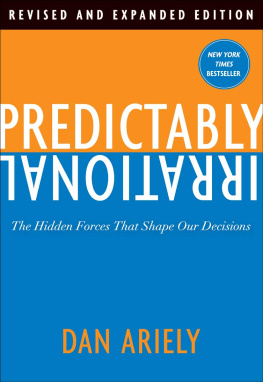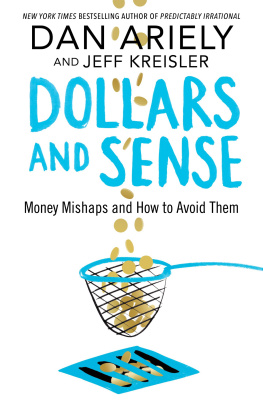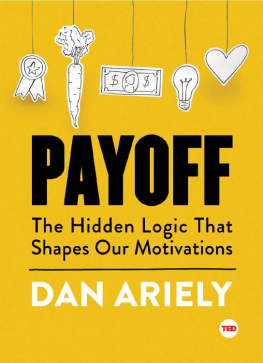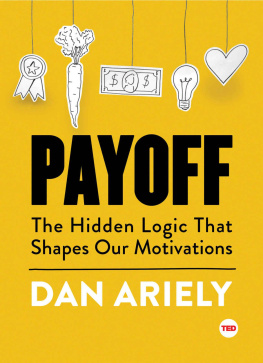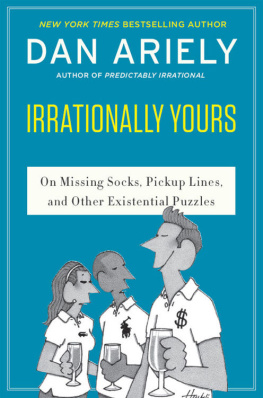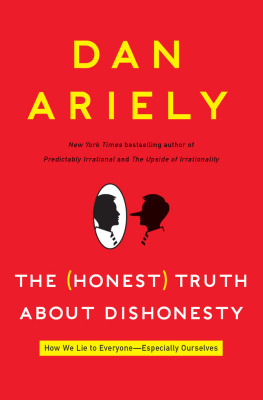Dan Ariely - The Upside of Irrationality: The Unexpected Benefits of Defying Logic at Work and at Home
Here you can read online Dan Ariely - The Upside of Irrationality: The Unexpected Benefits of Defying Logic at Work and at Home full text of the book (entire story) in english for free. Download pdf and epub, get meaning, cover and reviews about this ebook. year: 2010, genre: Science. Description of the work, (preface) as well as reviews are available. Best literature library LitArk.com created for fans of good reading and offers a wide selection of genres:
Romance novel
Science fiction
Adventure
Detective
Science
History
Home and family
Prose
Art
Politics
Computer
Non-fiction
Religion
Business
Children
Humor
Choose a favorite category and find really read worthwhile books. Enjoy immersion in the world of imagination, feel the emotions of the characters or learn something new for yourself, make an fascinating discovery.
- Book:The Upside of Irrationality: The Unexpected Benefits of Defying Logic at Work and at Home
- Author:
- Genre:
- Year:2010
- Rating:3 / 5
- Favourites:Add to favourites
- Your mark:
- 60
- 1
- 2
- 3
- 4
- 5
The Upside of Irrationality: The Unexpected Benefits of Defying Logic at Work and at Home: summary, description and annotation
We offer to read an annotation, description, summary or preface (depends on what the author of the book "The Upside of Irrationality: The Unexpected Benefits of Defying Logic at Work and at Home" wrote himself). If you haven't found the necessary information about the book — write in the comments, we will try to find it.
The Upside of Irrationality: The Unexpected Benefits of Defying Logic at Work and at Home — read online for free the complete book (whole text) full work
Below is the text of the book, divided by pages. System saving the place of the last page read, allows you to conveniently read the book "The Upside of Irrationality: The Unexpected Benefits of Defying Logic at Work and at Home" online for free, without having to search again every time where you left off. Put a bookmark, and you can go to the page where you finished reading at any time.
Font size:
Interval:
Bookmark:
To my teachers, collaborators, and students,
for making research fun and exciting.
And to all the participants who took part in our
experiments over the yearsyou are the engine of this
research, and I am deeply grateful for all your help.
Lessons from Procrastination and Medical Side Effects
I dont know about you, but I have never met anyone who never procrastinates. Delaying annoying tasks is a nearly universal problemone that is incredibly hard to curb, no matter how hard we try to exert our willpower and self-control or how many times we resolve to reform.
Allow me to share a personal story about one way I learned to deal with my own tendency to procrastinate. Many years ago I experienced a devastating accident. A large magnesium flare exploded next to me and left 70 percent of my body covered with third-degree burns (an experience I wrote about in Predictably Irrational ). As if to add insult to injury, I acquired hepatitis from an infected blood transfusion after three weeks in the hospital. Obviously, there is never a good time to get a virulent liver disease, but the timing of its onset was particularly unfortunate because I was already in such bad shape. The disease increased the risk of complications, delayed my treatment, and caused my body to reject many skin transplants. To make matters worse, the doctors didnt know what type of liver disease I had. They knew I wasnt suffering from hepatitis A or B, but they couldnt identify the strain. After a while the illness subsided, but it still slowed my recovery by flaring up from time to time and wreaking havoc on my system.
Eight years later, when I was in graduate school, a flare-up hit me hard. I checked into the student health center, and after many blood tests the doctor gave me a diagnosis: it was hepatitis C, which had recently been isolated and identified. As lousy as I felt, I greeted this as good news. First, I finally knew what I had; second, a promising new experimental drug called interferon looked as if it might be an effective treatment for hepatitis C. The doctor asked whether Id consider being part of an experimental study to test the efficacy of interferon. Given the threats of liver fibrosis and cirrhosis and the possibility of early death, it seemed that being part of the study was clearly the preferred path.
The initial protocol called for self-injections of interferon three times a week. The doctors told me that after each injection I would experience flulike symptoms including fever, nausea, headaches, and vomitingwarnings that I soon discovered to be perfectly accurate. But I was determined to kick the disease, so every Monday, Wednesday, and Friday evening over the next year and a half, I carried out the following ritual: Once I got home, I would take a needle from the medicine cabinet, open the refrigerator, load the syringe with the right dosage of interferon, plunge the needle deep into my thigh, and inject the medication. Then I would lie down in a big hammockthe only interesting piece of furniture in my loftlike student apartmentfrom which I had a perfect view of the television. I kept a bucket within reach to catch the vomit that would inevitably come and a blanket to fend off the shivering. About an hour later the nausea, shivering, and headache would set in, and at some point I would fall asleep. By noon the next day I would have more or less recovered and would return to my classwork and research.
Along with the other patients in the study, I wrestled not only with feeling sick much of the time, but also with the basic problem of procrastination and self-control. Every injection day was miserable. I had to face the prospect of giving myself a shot followed by a sixteen-hour bout of sickness in the hope that the treatment would cure me in the long run. I had to endure what psychologists call a negative immediate effect for the sake of a positive long-term effect. This is the type of problem we all experience when we fail to do short-term tasks that will be good for us down the road. Despite the prodding of conscience, we often would rather avoid doing something unpleasant now (exercising, working on an annoying project, cleaning out the garage) for the sake of a better future (being healthier, getting a job promotion, earning the gratitude of ones spouse).
At the end of the eighteen-month trial, the doctors told me that the treatment was successful and that I was the only patient in the protocol who had always taken the interferon as prescribed. Everyone else in the study had skipped the medication numerous timeshardly surprising, given the unpleasantness involved. (Lack of medical compliance is, in fact, a very common problem.)
So how did I get through those months of torture? Did I simply have nerves of steel? Like every person who walks the earth, I have plenty of self-control problems and, every injection day, I deeply wanted to avoid the procedure. But I did have a trick for making the treatment more bearable. For me, the key was movies. I love movies and, if I had the time, I would watch one every day. When the doctors told me what to expect, I decided to motivate myself with movies. Besides, I couldnt do much else anyway, thanks to the side effects.
Every injection day, I would stop at the video store on the way to school and pick up a few films that I wanted to see. Throughout the day, I would think about how much I would enjoy watching them later. Once I got home, I would give myself the injection. Then I would immediately jump into my hammock, make myself comfortable, and start my mini film fest. That way, I learned to associate the act of the injection with the rewarding experience of watching a wonderful movie. Eventually, the negative side effects kicked in, and I didnt have such a positive feeling. Still, planning my evenings that way helped me associate the injection more closely with the fun of watching a movie than with the discomfort of the side effects, and thus I was able to continue the treatment. (I was also fortunate, in this instance, that I have a relatively poor memory, which meant that I could watch some of the same movies over and over again.)
T HE MORAL OF this story? All of us have important tasks that we would rather avoid, particularly when the weather outside is inviting. We all hate grinding through receipts while doing our taxes, cleaning up the backyard, sticking to a diet, saving for retirement, or, like me, undergoing an unpleasant treatment or therapy. Of course, in a perfectly rational world, procrastination would never be a problem. We would simply compute the values of our long-term objectives, compare them to our short-term enjoyments, and understand that we have more to gain in the long term by suffering a bit in the short term. If we were able to do this, we could keep a firm focus on what really matters to us. We would do our work while keeping in mind the satisfaction wed feel when we finished our project. We would tighten our belts a notch and enjoy our improved health down the line. We would take our medications on time and hope to hear the doctor say one day, There isnt a trace of the disease in your system.
Sadly, most of us often prefer immediately gratifying short-term experiences over our long-term objectives. We routinely behave as if sometime in the future, we will have more time, more money, and feel less tired or stressed. Later seems like a rosy time to do all the unpleasant things in life, even if putting them off means eventually having to grapple with a much bigger jungle in our yard, a tax penalty, the inability to retire comfortably, or an unsuccessful medical treatment. In the end, we dont need to look far beyond our own noses to realize how frequently we fail to make short-term sacrifices for the sake of our long-term goals.
W HAT DOES ALL of this have to do with the subject of this book? In a general sense, almost everything.
Font size:
Interval:
Bookmark:
Similar books «The Upside of Irrationality: The Unexpected Benefits of Defying Logic at Work and at Home»
Look at similar books to The Upside of Irrationality: The Unexpected Benefits of Defying Logic at Work and at Home. We have selected literature similar in name and meaning in the hope of providing readers with more options to find new, interesting, not yet read works.
Discussion, reviews of the book The Upside of Irrationality: The Unexpected Benefits of Defying Logic at Work and at Home and just readers' own opinions. Leave your comments, write what you think about the work, its meaning or the main characters. Specify what exactly you liked and what you didn't like, and why you think so.

